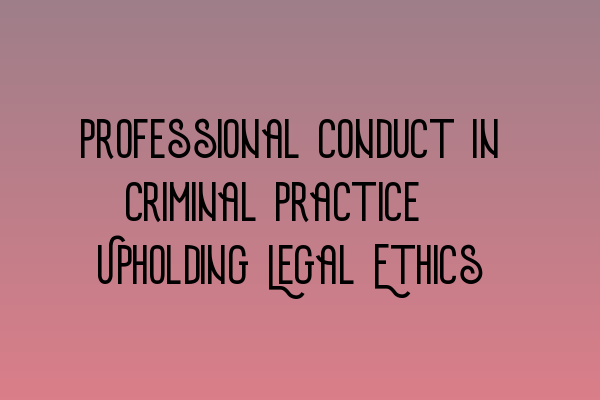Professional Conduct in Criminal Practice: Upholding Legal Ethics
Welcome to the SQE Criminal Law & Practice Law UK blog! In this article, we will be discussing the importance of professional conduct in criminal practice and how it relates to upholding legal ethics. At SQE Criminal Law & Practice Law UK, we understand the significance of maintaining the highest standards of professional conduct in the field of criminal law. With our expertise and comprehensive approach to legal education, we strive to equip aspiring criminal law professionals with the knowledge and skills necessary to navigate ethical dilemmas encountered in practice.
The Importance of Professional Conduct
Professional conduct in criminal practice plays a crucial role in upholding the integrity of the legal profession. It encompasses a range of ethical responsibilities that practitioners must adhere to in order to ensure a fair and just legal system.
As legal professionals, we have a duty to act in the best interests of our clients while maintaining the highest moral and ethical standards. This includes treating all parties involved with fairness, respect, and impartiality.
By upholding professional conduct, criminal law practitioners contribute to the overall public trust and confidence in the legal system. Clients, judges, and fellow legal professionals rely on us to act with integrity and professionalism throughout the entire criminal justice process.
Key Principles of Professional Conduct
There are several key principles that guide professional conduct in criminal practice. These principles serve as a framework to ensure legal professionals act in an ethical manner:
- Honesty and Integrity: Legal professionals must always act honestly and with integrity. This includes providing accurate information, being transparent, and maintaining confidentiality.
- Conflict of Interest: Criminal law practitioners must avoid situations where there is a conflict of interest. This means putting the interests of clients above any personal, financial, or professional conflicts.
- Client Confidentiality: Protecting client confidentiality is of utmost importance. Practitioners must safeguard their clients’ information and only share it with consent or as required by law.
- Impartiality and Fairness: Legal professionals should maintain impartiality and fairness throughout the criminal justice process. This includes treating all parties equally, regardless of personal biases or external influences.
- Continuing Professional Development: Keeping up-to-date with changes in criminal laws, procedures, and precedents is vital. Regular participation in workshops and seminars, such as those offered by SQE Criminal Law & Practice Law UK, helps enhance expertise in the field.
For more information on workshops and seminars that can expand your expertise in criminal practice, check out our article “Workshops and Seminars on Criminal Practice: Expanding Your Expertise”.
Ensuring Ethical Practice
To ensure ethical practice, aspiring criminal law professionals must continuously work towards the following:
- Staying Informed: Keeping up with updates in UK criminal laws is essential to provide effective representation. To learn more about staying informed and prepared, read our article “Updates in UK Criminal Laws: Staying Informed and Prepared”.
- Collaborating with Study Groups: Enhancing your SQE criminal law study group experience can foster discussions on professional conduct and legal ethics. Find out more in our article “Enhancing Your SQE Criminal Law Study Group Experience”.
- Understanding Criminal Evidence Rules: Properly decoding criminal evidence rules is crucial for building a strong defense. Read our detailed analysis in the article “Decoding Criminal Evidence Rules: A Detailed Analysis”.
- Supporting Victims’ Rights: Ensuring the rights of victims in criminal procedures is a vital aspect of legal practice. Learn more about the legal protections and support available in our article “Ensuring Rights of Victims in Criminal Procedures: Legal Protections and Support”.
At SQE Criminal Law & Practice Law UK, we are dedicated to providing the necessary tools and knowledge to uphold professional conduct in criminal practice. Our comprehensive study materials, workshops, and seminars are designed to equip future criminal law professionals with the skills needed to navigate complex ethical situations.
By committing to professional conduct, we can contribute to a fair and just criminal justice system while maintaining the highest level of ethical standards.
